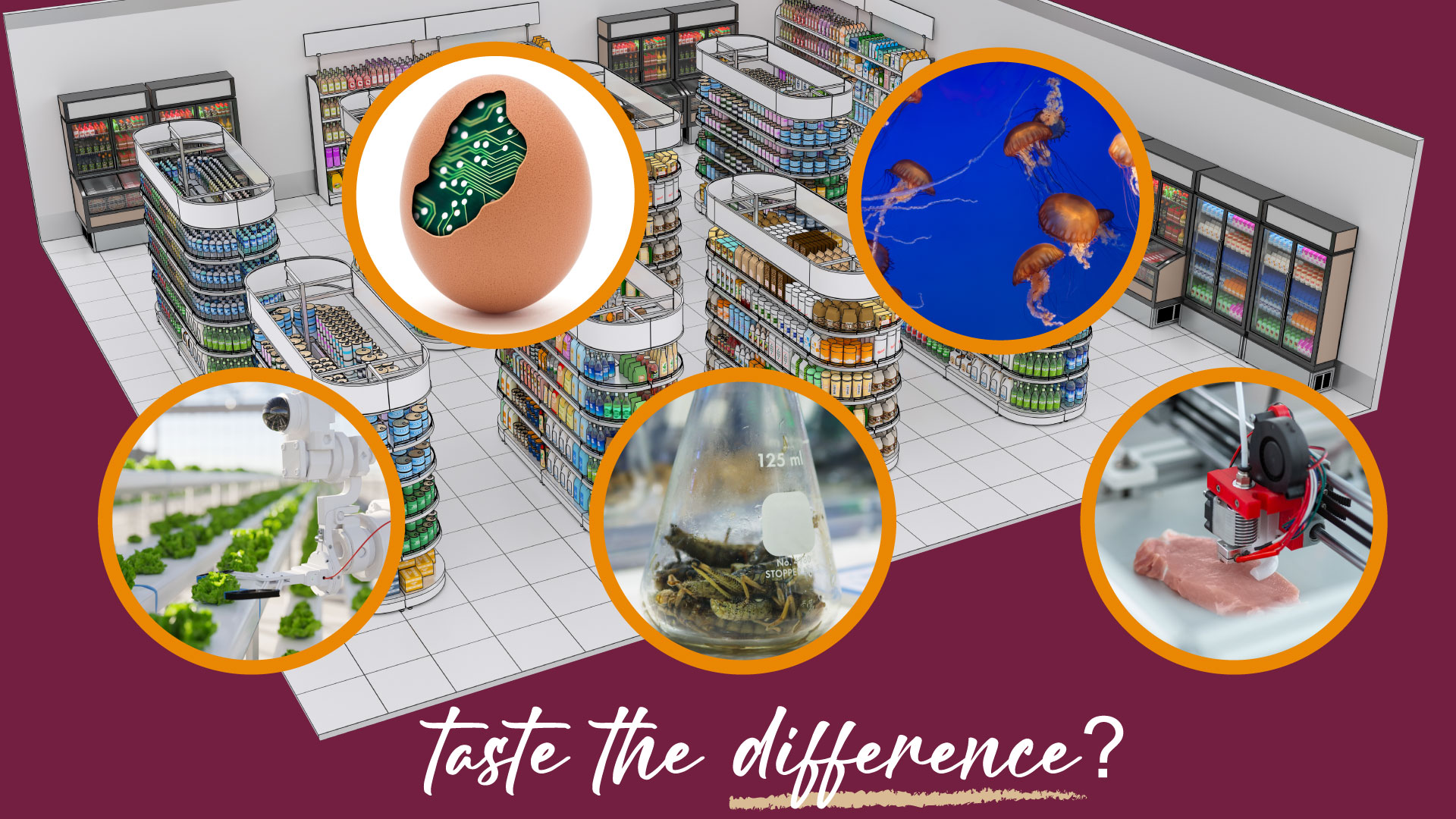Content Sections
Listen to the article and letter
Read the article and letter
We — and many of our supporters in the UK – are very concerned about a change in direction by one of the UK's leading supermarket chains, Sainsbury's, traditionally a supporter of organic foods, regenerative farming, high animal welfare standards, and ethical foods. These concerns are brought into sharp focus by the passage of a recent law that allows producers to get gene edited foods to market without safety testing. Our concerns are amplified by views contained in Sainsbury's Future of Food report released in 2019, to celebrate its 150 years of existence.
Based on this report, it also looks like Sainsbury’s may be turning its back on agro-ecological and regenerative farming and deciding to go full-steam ahead with supporting foods that are products of modern biotechnology, such as gene-edited foods.
Rob Verkerk, our founder and executive director, has therefore, today, sent an open letter to the CEO of Sainsbury’s, copied to Claire Hughes, Head of Quality and Innovation, asking that the company clarifies its position in relation to these two opposing approaches (see below).
Our net impact can be greatly magnified if you also send letters. These are much more powerful if individualised. We therefore urge our UK members and supporters to send individual letters expressing your concerns for Sainsbury’s apparent support for gene edited foods by email at [email protected] or by snail mail (Mr Roberts doesn’t have much of a social media presence) to the following address:
Mr Simon Roberts
CEO of Sainsburys
33 Holborn
London
EC1N2HT
Feel free to draw anything you want from Rob’s open letter below.
Remember – it’s the grassroots and consumer power that can be the major force for good in a world that is otherwise being overtaken by corporate greed, at the expense of humanity and our fundamental freedoms.
Huge thank you to those of you who will take time out to send your individualised letters to Simon Roberts. Please keep us posted of any responses you might get; we’ll of course let you know the response to Rob’s letter too!
DOWNLOAD A PDF COPY OF THE OPEN LETTER TO SIMON ROBERTS, CEO OF SAINBURY’S, REGARDING GENETIC TECHNOLOGIES AND FUTURE FOOD.
Simon Roberts
CEO
Sainsburys
33 Holborn
London EC1N2HT
England 21 March 2024
OPEN LETTER: SAINSBURY’S FUTURE OF FOOD REPORT AND GENETIC TECHNOLOGIES IN FOOD PRODUCTION
As a non-profit organisation supporting the development and regeneration of human health by natural means, especially through nutrition and lifestyle, we have long appreciated the role played by Sainsbury’s in the UK in bringing healthful foods to the market, including animal products with high welfare standards.
However, we wish to alert you to our deep concerns, voiced to us by some of our membership and supporters, over a number of issues raised in your Future of Food report, published to celebrate Sainsbury’s 150th anniversary. One of the greatest single concerns is Sainsbury’s apparent support for synthetic biology (synbio), referred to in law as “modern biotechnology”, notably the genetic alteration of traditional foods or ingredients, and the creation of new ‘fake’ foods, through the application of gene editing (GE) technologies.
We believe that Sainsbury’s apparent support for unproven synbio technologies, increasingly being justified by the agri-food industry as necessary to feed growing populations, to protect the natural environment or to avert climate change, marks a significant change in Sainsbury’s policy and values, as set out in your ‘Healthy and Better’ policy which seeks to provide consumers with “great value, healthy food that is produced sustainably”. If Sainsbury’s becomes, as proposed in the Future of Food report, a pioneer in bringing gene-edited, cultured synbio (‘fake’) foods to market, many traditional Sainsbury’s consumers, including those in our own support base, will be unlikely to continue to frequent your stores.
There also appears to be confusion, re-direction or contradiction within your existing and future policies, as delineated in the Future of Food report, especially as far as these relate to your future commitment to agro-ecological or regenerative practices. Such approaches have been shown to be essential to sustainable food production and are central policies of organisations such as IFOAM Organics International, Regeneration International and the UK’s Soil Association. “Agro-ecological” (or related terms) does not appear even once in your Future of Food Report report, and “regenerative” farming is only mentioned on one page, Farming Impossible Environments, near the end of the report (page 24), so appears to have been dropped as a central, future food policy of Sainsbury’s. Eating local, as James Wong says in his section on Planet-Friendly Foods (page 6 of the Future of Food report), is completely at odds with the notion, suggested by Claire Hughes (in the Foreword) of farming in space, or supplying nutrients, not via foods, but via skin patches. Is Sainbury’s going to be playing both sides of the fence, on one hand supporting traditional, soil-building, agro-ecological farming approaches, while also supporting genetic manipulation of foods and a new generation of entirely novel, ‘frankenfoods’ or nutrients, delivered via the skin or cultivated off-planet?
Current trends in viewing GE food technologies as a panacea to our food, health and environmental woes are deeply disturbing to those of us who have studied our evolutionary relationship with food, and how the vast majority of our growing disease burden is the result of our maladaptation to contemporary diets (including ultra-processed foods) and lifestyles.
Synbio food would be less of an issue if only those foods or ingredients that were demonstrated to be safe following thorough safety studies were brought to market. But you will be aware that there has been very strong pressure from UK agri-food industry stakeholders, and the biotechnology companies that are set to gain from the development of GE and other synbio foods, to circumvent such safety testing previously required for all genetically modified foods.
The agri-food and biotechnology sector has been a major driver of the Genetic Technology (Precision Breeding) Bill that was considered not fit for purpose in an opinion by the Regulatory Products Committee after it was proposed in 2022. The bill has now passed into law, as the Genetic Technology (Precision Breeding) Act 2023, following Royal Assent on 23rd March 2023. We are not aware of Sainsbury's position on this Act.
This law creates an entirely new category of human food, namely that based on any “precision bred organism”, this being defined as a product of modern biotechnology where “every feature of its genome that results from the application of modern biotechnology could have resulted from traditional processes, whether or not in conjunction with selection techniques, alone, and…its genome does not contain any feature that results from the application of any artificial modification technique other than modern biotechnology.”
You may or may not be aware that a GE cultured ‘dairy’ product called Bored Cow has been released on the US market and has been found to contain 92 compounds unknown to science along with a series of known toxins and allergens not present in naturally produced cow’s milk. It is perverse that such a product results from so-called precision fermentation when the output is so imprecise. We recently publicised concerns over Bored Cow in an article on our ANH-USA website.
The Genetic Technology (Precision Breeding) Act, by virtue of the fact it allows GE technologies to be used on the condition that an “organism’s genome could have resulted from traditional processes [and where] no account is to be taken of its location in the genome”, is almost guaranteed to result in unknown, unpredictable (imprecise) consequences. This is because gene expression is not only related to traits incorporated within the genome, it is also related to the specific location of those traits in relation to other coding and non-coding regions of the genome. This knowledge has become particularly apparent in post-genomic research undertaken since the completion of the Human Genome Project.
Our ask
Based on the views proposed in your Future of Food report, and the confusion it has caused among some of your customers and our supporters, we request that Sainsbury’s clarifies its position on the three following questions:
- What is Sainsbury’s current and future commitment to agro-ecological and regenerative farming approaches?
- Is Sainsbury’s in support of the UK’s Genetic Technology (Precision Breeding) Act 2023?
- Is Sainsbury's prepared to bring to market, through its stores and online retail channels, human food products derived from genetic technology-based ‘precision bred organisms'?
Many thanks for your urgent consideration of the issues raised in this letter, and in particular, your response to the three questions above.
Yours faithfully,
Robert Verkerk PhD
Founder, executive and scientific director, Alliance for Natural Health International
cc: Claire Hughes, Head of Quality and Innovation, Sainbury’s
>>> If you’re not already signed up for the ANH International weekly newsletter, sign up for free now using the SUBSCRIBE button at the top of our website – or better still – become a Pathfinder member and join the ANH-Intl tribe to enjoy benefits unique to our members.
>> Feel free to republish - just follow our Alliance for Natural Health International Re-publishing Guidelines
>>> Return to ANH International homepage








Comments
your voice counts
24 March 2024 at 9:36 am
Thank you for bringing this to our attention - we will be writing to Sainsbury’s which is our go to supermarket.
25 March 2024 at 8:25 am
Thanks so much for your support Colin. Please let us know if you receive a response to your letter.
Warm wishes
Melissa
25 March 2024 at 1:46 pm
Thanks for the alert and wake up I will be writing to Mr Simon Roberts or most probably his front. Certainly, Sainsbury are the flagship `supermarket' and most probably chosen to set the precedent for the others -so this is the way of doing things now and present politics are all.
My late wife started at Guildford manual shop in 1960 and certainly the quality and integrity was a the standard to follow.
Sainsbury, absolutely were the food shopping lifestyle, trustworthy and safe and healthy food . It is frightening to hear this much respected family backed supplier of some wealth incidentally, built up on all our family trust, will set the ` standard' as the largest consumer base for these `products', which I doubt are nutritious edible products at all, and if so then we are all destined to a pretty poor choice of future wholesome metabolic foods .
Further, how will this affect the smaller suppliers as they will go out of business furthering our food strife. I can see this is also a clever trick by the corporatism of which Sainsbury, now, must be an inclusive participator.
25 March 2024 at 5:05 pm
Hi Don
Thanks for your comment. This is a significant question, if precision fermented ' foods' become the norm what happens to all the farmers?
Let us know if you receive a response to your letter.
Warm wishes
Melissa
Your voice counts
We welcome your comments and are very interested in your point of view, but we ask that you keep them relevant to the article, that they be civil and without commercial links. All comments are moderated prior to being published. We reserve the right to edit or not publish comments that we consider abusive or offensive.
There is extra content here from a third party provider. You will be unable to see this content unless you agree to allow Content Cookies. Cookie Preferences